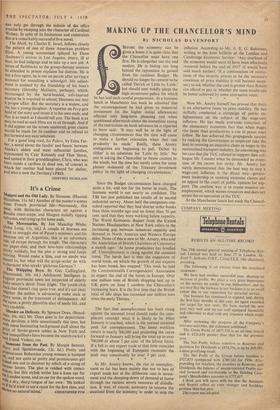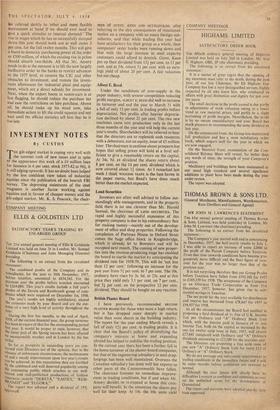MAKING UP THE CHANCELLOR'S MIND
By NICHOLAS DAVENPORT BEFORE the economy can be given a boost it is quite clear that the Chancellor must have one first. He is altogether too shy and modest. He is hiding too long behind the reputation he gained from his cautious Budget. He should no longer be content to be called `Derick or Little by Little,' but should now boldly adopt the high investment policy for which he has laid such careful preparation. At a business lunch in Manchester last week he admitted that the encouragement he had given to industrial investment (in the higher initial allowances) affected only long-term planning and when questioned afterwards about the immediate easing of the restrictions on bank advances he is reported to have said : 'It may well be in the light of changing circumstances that the time will come to make a further relaxation when that can prudently be made.' Really, these Amory ambiguities are beginning to pall. 'Dither by dither' is no substitute for 'Little by little.' No one is asking the Chancellor to throw caution to the winds, but the time has surely come for some plainer statement of the Treasury investment policy 'in the light of changing circumstances.'
Since the Budget circumstances have changed quite a lot, and not for the better in trade. The business world is not nearly so confident. The FBI has just published the results of its second industrial survey. About half the companies con- sulted reported that they had shorter order books than three months ago and no fewer than 76 per cent. said that they were working below capacity. The World Economic Report from the United Nations Headquarters in New York refers to the increasing gap between industrial capacity and demand in North America and Western Europe alike. None of this is new to Mr. Amory, who told the Association of British Chambers of Commerce a month ago: 'At home production has levelled off. Unemployment is rising against the seasonal trend. The harsh fact is that the expansion of world trade, on which the growth of our exports has been based, has stopped.' This week he told the Commonwealth Correspondents' Association to expect the end of the boom in Europe. Over one million tons of British shipping laid up in UK ports on June 1 confirm the Chancellor's increasing fears. It is the first time that the British total of idle ships has exceeded one million tons since the early Thirties.
The fact that unemployment has been rising against the seasonal trend should make the com- placent consider what it is likely to be when -Urinary is reached, which is the normal seasonal peak for unemployment. The latest workless return is nearly 500,000 and projecting the curve forward to January will bring the total up to over 700,000 or about 3 per cent. of the labour force. If a fall in our export trade at that time coincides with the beginning of European recession the peak may conceivably be over 3 per cent.
As Mr. Amory knows, the rise in unemploy- ment so far has been mainly due not to loss of export trade but to the deliberate cuts in invest- ment and the damping-down of demand at home through the various severe measures of disinfla- tion. It was, of course, necessary to remove the overload from the economy in order to stop the
inflation. According to Mr. A. E. G. Robinson, writing in the June bulletin of the London and Cambridge Economic Service : 'Any overload of the economy would seem to have been effectively removed before the end of 1957' (I would have said much earlier). 'If a continuation of restric- tions of this severity proves to be the necessary condition of price stability it will become neces- sary to ask whether the cost is greater than Britain can afford to pay or whether the same results cart be better achieved by some alternative route.'
Now Mr. Amory himself has proved that there is an alternative route to price stability. He has skilfully conducted a campaign of public en- lightenment on the subject of the wage-cost inflation. He has made everyone conscious of the elementary economic fact that when wages rise faster than productivity a rise in prices must follow. He has achieved this propaganda success by making the Government as employer take the lead in resisting an excessive claim in wages in the nationalised transport industry. So convincing was his case that the TUC refused to support their col- league Mr. Cousins when he demanded an exten- sion of the recent bus strike. Mr. Amory has surely demonstrated that the best way to stop a wage-cost inflation is the direct way—govern- ment leadership in resisting excessive claims and an appeal to the court of public opinion for sup- port. The costliest way is to create massive un- employment, which wastes resources and does not secure the co-operation of the TUC.
At the Manchester lunch last week the Chancel- kir referred darkly to 'other and more flexible instruments at hand if we should ever need to give a quick stimulus to internal demand.' The rise in wages which he has so successfully damped down this year should work out at well under 3 per cent. for the full twelve months. This will give a boost to domestic purchasing power of the order or £300 million, of which the existing rise in prices should absorb two-thirds. All that Mr. Amory needs to do at the moment is to lift the now largely ineffective &der to the banks to restrict advances to the 1957 level, to remove the C1C and other obstacles to investment, and restore the invest- ment allowances for industrial plant and equip- ment, which are a direct subsidy for investment. Next, when the export boom in motor-cars is at last flagging, he should reduce the purchase tax and ease the restrictions on hire purchase. Above all, he should make up his mind now, take immediate action to lift the credit squeeze and not wait until the official statistics tell him that he is too late.























































 Previous page
Previous page